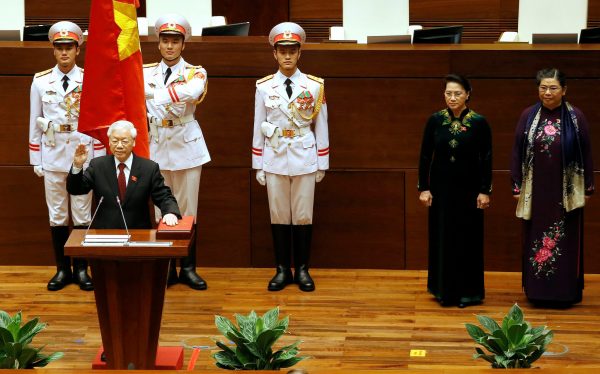While unusual, this is not the first time that a leader has worn the dual hat. From 1951–69, and during the latter half of 1986, Ho Chi Minh and Truong Chinh were respectively party chief-cum-head of state. What is unprecedented, though, is that Trong is the first to be the chair of both the Central Military Commission and the Central Party Commission for Public Security.
With such a concentration of power, it is tempting to call Trong Vietnam’s Xi Jinping. But a comparison to the Chinese strongman would be misleading. While Xi’s dream is to make China great again (and himself greater than Mao), Trong’s ambition is to save the CPV from decay. While Xi is willing to take risks, Trong is extremely risk-averse. And while there is no time limit to Xi’s hold on power, the CPV constitution rules out Trong’s re-election as party chief in 2021.
It would also be misleading to compare Trong to powerful leaders of Vietnam’s past like Le Duan and Nguyen Tan Dung. Unlike Duan and Dung, Trong lacks the dynamism and connections that would translate his leadership of top offices into widespread influence.
Trong’s new power monopoly is unlikely to lead to any big changes in Vietnamese politics. As General Secretary, Trong has been fighting a two-front battle against both corruption and liberalism. Now that he is the country’s dominant leader, he is simply intensifying the battle on both fronts, inducing more authoritarian politics.
Trong’s signature anti-corruption campaign was first introduced in 2011 to focus on censuring then prime minister Nguyen Tan Dung, who was thought to sit at the apex of a vast network of corrupt officials. Dung was never censured but he was pressured to step down after the CPV’s 12th National Congress in January 2016. Since then, nearly 60 former and current senior level officials have been reprimanded.
But Trong’s drive is more symbolic than substantial. Very few officials have lost their seats. Instead, many were merely admonished or reprimanded, while several others were stripped of positions they no longer held. Of the 16 CPV Central Committee members who were censured, only four were in office. The other 12 were already in retirement.
Although corruption is widely known to be rampant, even at the top echelons of Vietnam’s political hierarchy, only one Politburo member and one sitting minister have been dismissed so far. Trong has warned that the next stage of the campaign will address a few cases of ‘petty corruption’ involving lower level officials, only confirming just how symbolic the campaign is.
While lamenting that ‘corruption is threatening the survival of the regime’, Trong believes that ‘political decadence’ is even more dangerous. Two weeks after he was nominated as president, the CPV announced its intention to reprimand former vice minister of science and technology Chu Hao. Hao quickly renounced his CPV membership, prompting the Party to dismiss him altogether. A public intellectual and reform advocate, Hao pioneered a publishing house promoting liberal thought. He was censured for his ‘serious violation of the party’s principles’ and for ‘speaking and writing outside the party line’. The case of Chu Hao is illustrative of Trong’s larger anti-liberalism agenda.
Trong’s position as president will also increase his role in foreign affairs. Despite being a career ideologue, Trong has learnt to be more pragmatic when stepping outside of party channels to interact with foreign counterparts. He is likely to be even more pragmatic in foreign policy when wearing the less ideological hat of president.
Trong will continue to keep the balance in Vietnam’s relations between China and the United States, veering farther — but not too far — from China and closer — but not too close — to the United States. And he will continue to insure this balancing act through stronger ties with India, Japan and Russia and ASEAN member states.
The next two years of Vietnamese politics will bear the signature mark of General Secretary and President Trong. His regime will crack down more intensely on both corruption and liberalism, but it is unlikely that this will bring about any substantial or long-term political changes.
Alexander L Vuving is a Professor at the Daniel K Inouye Asia-Pacific Center for Security Studies, Honolulu.
The views expressed in this article are the author’s own and do not necessarily reflect those of the US government, DKI APCSS, or any other US government agencies.

